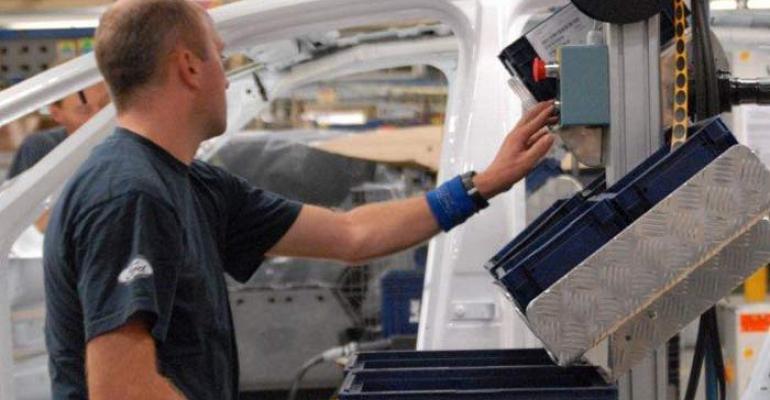Ford once again relied heavily on North America, and to a lesser degree the Asia-Pacific and Africa region, to post a 2013 first-quarter $2.1 billion pre-tax profit.
“North America has achieved a record quarterly performance since at least 2000,” CEO Alan Mulally says in a conference call with analysts and journalists today to discuss the Q1 results. “Asia-Pacific earned a small profit, while Europe and South America incurred losses.”
The auto maker’s Q1 pre-tax profit was down $147 million compared with prior-year due to losses in South America, but still represented Ford’s 15th consecutive profitable quarter. Net income was $1.6 billion, an increase of $215 million compared with year-ago.
Ford’s North America home market posted a record $2.4 billion pre-tax profit, marking a $309 million increase compared with prior-year. The region benefited from strong sales of the Ford Fusion midsize sedan and Escape cross/utility vehicle, which helped boost the auto maker’s U.S. retail market share to 14.0%, up from 13.8% in first-quarter 2012.
“We had a lot of benefit from Fusion and Escape, both up year-over-year, and a lot of (the share increase) took place on the coast and in the Southeast, which is exactly what we wanted to deliver,” Chief Financial Officer Bob Shanks says.
The auto maker’s North American Q1 wholesale volume was up 17%, compared with year-ago, to 761,000 units, while revenue jumped 20% to $22.3 billion.
Asia-Pacific and Africa posted a pre-tax profit of $6 million, up $101 million compared with Q1 2012. Ford has invested heavily in the region, with seven new plants under construction, including five in China. Wholesale volume in Asia-Pacific and Africa was 282,000 units, up 65,000 from year-ago.
“Asia-Pacific and Africa by mid-decade will represent a material portion of the company’s profits,” Shanks says. “We’re incurring engineering costs today to expand our portfolio, and are delicately balanced between strong growth and investments that will pay off in the next several years.”
Ford’s Q1 Asia-Pacific and Africa market share rose to 3%, a 30% improvement over like-2012 and a record for the quarter. In China, the auto maker’s share increased a point to 3.6%.
In Europe, which remains mired in a recession, Ford posted a $462 million pre-tax loss, an increase of $313 million over last year. Wholesale volume was 341,000 units, down 31,000.
Ford’s European share dropped to 7.7% from 8.5% year-ago, largely due to a shortage of C-segment vehicles, including the Focus. A concerted effort to improve retail sales while reducing rental and short-cycle deliveries also contributed to the decline.
The auto maker says it’s making progress in its European restructuring efforts, which include shuttering two U.K. facilities and its Genk, Belgium, assembly plant. Discussions are progressing at Genk, where hourly employees recently ratified a package of separation benefits. The factory is scheduled to close late next year.
“In Europe, we’re on track to meet our objectives and be profitable by mid-decade,” Mulally says.
Ford has no plans to increase incentives to boost sales and has worked to reduce dealer inventory levels, Shanks says. “Dealer stocks in Europe are in great shape. In Q4, we talked about reduction, and we got there. We’re now in the low-40 days’ range.”
Ford posted a Q1 pre-tax loss of $218 million in South America, down from a $54 million pretax profit in 2012, but says the region represents a unique set of challenges. Losses were due to an unfavorable exchange rate, most of which is related to Venezuela due to the devaluation of the bolivar and the weakening peso in Argentina.
Although Venezuela is a small market for Ford, which only sold 23,000 units there last year, it has a large impact on the auto maker’s global financial results, Shanks says.
“The exchange rate is controlled by the government and is artificially strong, so periodically they will do a one-time devaluation,” he says. “We get exposed on the asset side relative to liability, and when they devalue we have to devalue that asset (and) take a hit when we do that.”
Ford is boosting its South American product offerings and expects to break even in the region for full-year 2013.
The auto maker ended Q1 with $24.2 billion in automotive gross cash, up $1.2 billion from year-ago.





